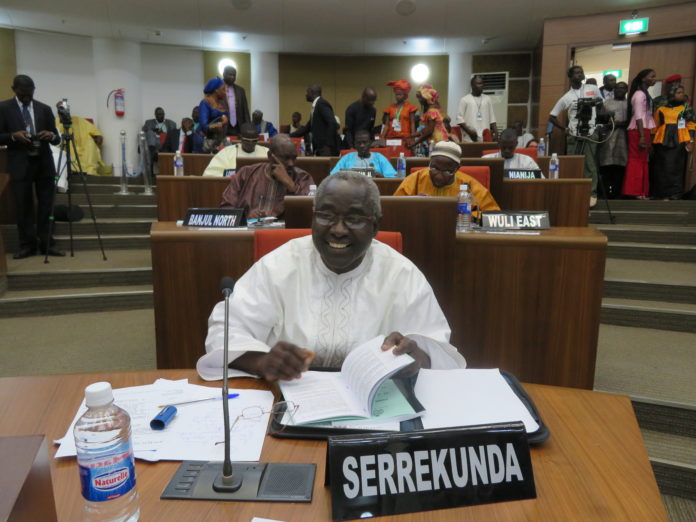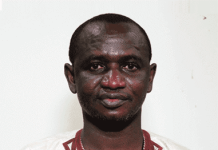By Yankuba Jallow
Honourable Halifa Sallah, the member for Serrekunda Constituency on Wednesday, 23rd September asked the Vice-President to tell Parliament the plans the Government has put in place to help civil servants during the pandemic.
Honourable Sallah said grade 12 of the salary grading system in The Gambia, which is the highest in the hierarchy, is approximately D10,000, grade 11 receives less than D10,000, grade 10 receives D7,000, grade 9 less than D7000, grade 8 receives D6,000, grade 7 receives less than D5600, grade 6 receives about D4000, grade 5 receives about D3000 and the list goes on.
“Where is the architecture of a civil service that is rewarded?” Sallah quizzed as he called upon the Vice-President to tell them what plans the plan put in place by Government help the civil servants during this pandemic.
On the President’s State of the Nation address, Sallah said what is more important is to situate the speech of the President to the National Development Plan by looking at the pillars.
Members of the National Assembly are currently debating the President Adama Barrow’s address before them. The President was represented by the Vice-President and she is expected to provide answers to all issues/questions raised by the legislators.
Sallah said in the introductory remarks of the President on page six, paragraph four, he [the President] emphasized that ‘the address should be appreciated within the context of a unique global pandemic and a crisis of tragic consequences.’ The address highlights the calamity that has dwindled resources – disrupted plans and schedules and shattered hopes and expectations.
Under paragraph five, he [the President] said, this is a crisis that has the world Ice turn and remains a threat to all nations rich and poor, big and small. Under paragraph nine – page seven, he [the President] concluded by emphasizing that the address would show the extent of the impact of the pandemic on the economy and social life and to indicate its implications on the 2018-2021 National Development Plan and therefore, on our national goals and objectives.
Honourable Sallah said the National Development Plan has the objective of mobilising 2.4 billion dollars for its implementation but the honourable Minister of Finance told them in his budget speech that what they managed to have in their coffers is $183,000,000 – 10% [ten per cent] of what is anticipated.
IMPACT OF COVID-19 ON THE ECONOMY
“Honourable Speaker, looking at what the President told us, it is clear that from an economic point of view, we are dealing with a State which has tremendous problems. He [the President] has indicated to us that the fiscal impact from the decline in import duties and other taxes is going to be D2.3 billion. This is what is anticipated,” Sallah said.
He sad how we balance the economy is very important on what is produced and consumed locally and what is imported. He said it is very important for lawmakers to understand the resource base of the country and to understand how COVID-19 is impacting on the resources and to understand what the country needs to do to address that.
So it is important to have a greater detail rather than just simply indicating some issues that have been indicated here regarding what would constitute the revenue base without going into the details, he said.
Sallah said the President indicated to them that by virtue of the fact that there had been shortages in terms of revenue earnings therefore they (the state) had to divert certain resources to be able to address urgencies.
“By doing that we are talking about virements. It is important that in doing so you comply with the Public Finance Act to see that what is vired is done in the right way and this is how parliament and the ministry have actually been working to be able to shape the public finance system of the country. Those who are in that body are fully conversant with the fact that this parliament have been assisting to build the fundamentals of the public finance system. This parliament has not worked against the interest of the country – it is shaping the architect of a genuine public finance in the country. We have reviewed what was necessary in terms of debt management and we started the process of getting reports which we need to look into and fine tune that will help the process. We have looked into the issue of getting foreign loans – that should come into the Central Bank and treasury main account – we could not know how they get in there and how they were spent. We have shaped all that which means this parliament has been assisting the ministry in order to do away with lapses that exist for over four decades. So therefore, this parliament has been working progressively to be different from every other parliament that has existed since the Gambia became an independent State. That is the reality.”
He said looking at the finance they would need greater detail to be provided so that they will know whether they need a revised budget.
“We had supplementary appropriation [of] 2.8 billion. So as we move, you will see the trend. Where do we put our money? What did it generate? Did we meet the expectations? This is precisely what this report [the President’s Address] is supposed to deliver,” Sallah said.





















